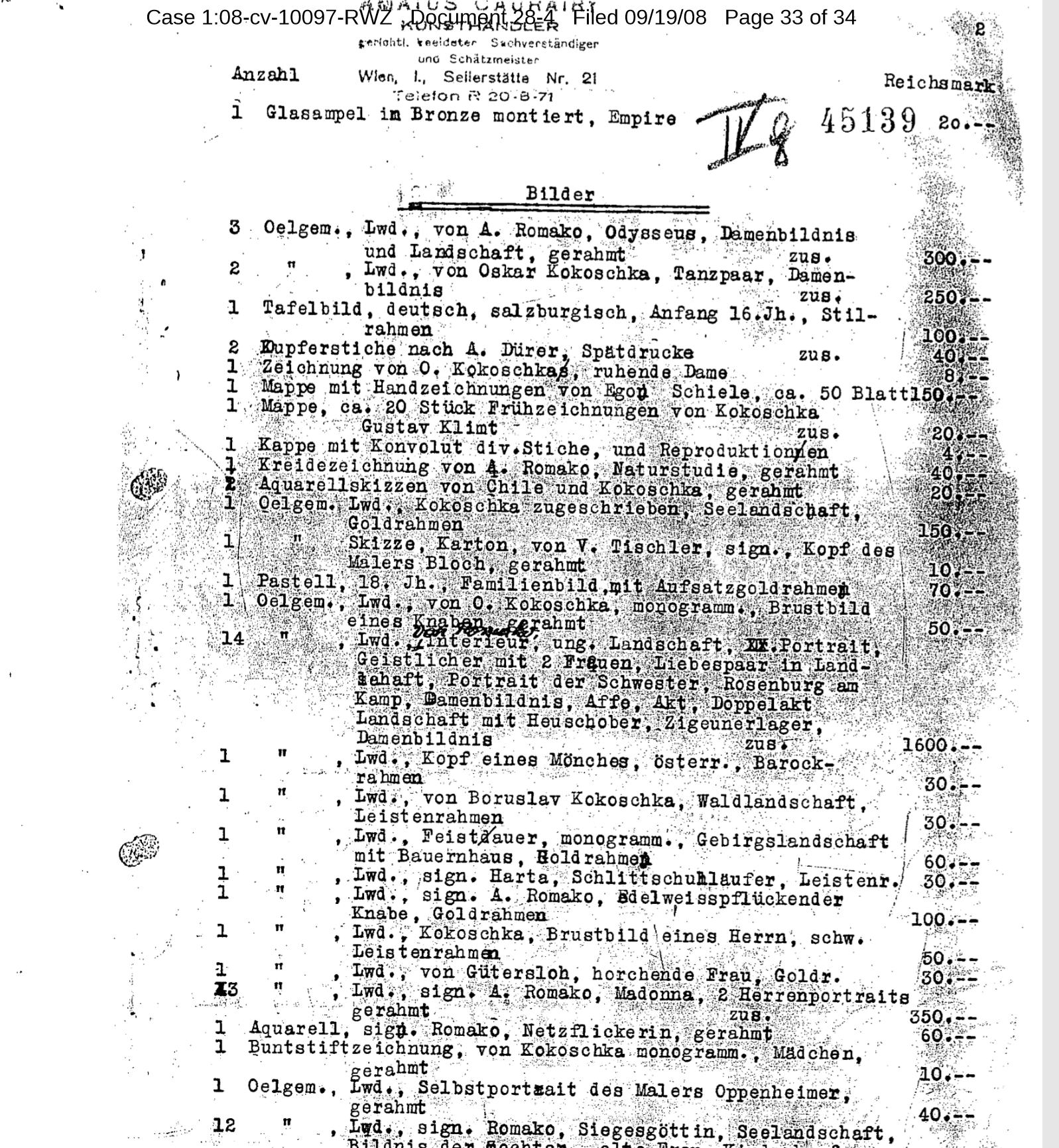I am proud to announce the publication in the Chapman Law Review of my article: “Turnabout is Foul Play: Sovereign Immunity and Cultural Property Claims,” which you can link to here. The abstract of the article is below.
Chapman Law Review Article Spotlights Recent Supreme Court Missteps on Sovereign Immunity and Cultural Property, Calls for Congress to Act
Topics: Second Hickenlooper Amendment, Act of State, Nazi-looted art, Foreign Sovereign Immunities Act, FSIA, expropriation exception”, 28 U.S.C. § 1605(a)(3), Genocide Convention, Nazi-confiscated art, F.R.G. v. Philipp, domestic takings, Chapman Law Review, Turnabout is Foul Play, Sovereign Immunity and Cultural Property Claims, Roberts Court, Taline Ratanjee, Greg Mikhanjian, Anna Ross, Amber Odell, Sara Morandi
New Law Requires Museums in New York to Display Information About Nazi Art Looting, May be More Complicated than it Looks
New York Governor Kathy Hochul has signed into law a new requirement requiring museums to indicate publicly any object in their collection that was displaced by the Nazis as part of what Congress has rightly called the largest organized theft of art in human history. The significance of this new rule is clear: New York is the center of the art world, and its museums hold a unique place of prominence. As readers of this blog or of my book A Tragic Fate-Law and Ethics in the Battle Over Nazi-Looted Art know, my view has long been that American museums vary widely in their candor and proactive approach to the issue of Nazi-looted art in their collections. Many have shown admirable initiative in probing their collections, while others have shown a regrettable passivity in waiting to receive and then deflect claims. Whether this bill will move the needle on that balance is the question. Transparency and disclosure have been the defining goals of the modern restitution era. This new law serves many of those ideals, but some unintended consequences may follow.
Topics: Metropolitan Museum of Art, American Alliance of Museums, Nazi-looted art, Foreign Sovereign Immunities Act, Washington Conference on Holocaust Era Assets, Supreme Court, Washington Principles on Nazi-Confiscated Art, AAM, Museum of Modern Art, Nuremberg race laws, Washington Conference Principles on Nazi-Stolen Ar, Association of Art Museum Directors, Washington Department of Labor and Industries, Solomon R. Guggenheim Museum, Museum of Fine Arts Boston, AAMD, Military Government Law 59, State Department, Holocaust Expropriated Art Recovery Act, HEAR Act, A Tragic Fate, Law and Ethics in the Battle Over Nazi-Looted Art, Governor Kathy Hochul, Reich Citizenship Law, Animal House, Kevin Bacon
FinCEN Signals Suspicion of Art Market Even Before AML Study Begins
In connection with the late-2020 amendment to the Bank Secrecy Act (BSA) to include “dealers in antiquities” as a result of its inclusion in the National Defense Authorization Act (NDAA), the Treasury Department’s Financial Crimes Enforcement Network (FinCEN) has issued a notice of “Efforts Related to Trade in Antiquities and Art.” The notice is a combination of guidance to entities now covered by the BSA, but it is also a potential backdoor around the entities that Congress chose not to regulate with respect to potential or perceived money laundering risks: art dealers. It also raises concerns about the objectivity of the forthcoming study of the art market that Congress instructed FinCEN to conduct. In either event, it is further evidence that momentum continues to gather for stricter oversight and regulation of the U.S. art market, and the importance of the art trade demonstrating more transparency and diligence if it hopes to modify or mitigate that regulation.
Topics: The Art Newspaper, Nazi-looted art, Antiquities, Terrorist financing, Responsible Art Market initiative, Money laundering, FinCEN, A Tragic Fate, Financial Crimes Enforcement Network, Illicit Art and Antiquities Trafficking Protection, suspicious activity reports, Corporate Transparency Act of 2019, Bank Secrecy Act, National Defense Authorization Act
At U.S. Supreme Court, Jewish Heirs Lay Claim to Treasure Taken by Nazi Agents in 1935
(WASHINGTON-October 22, 2020) The heirs to the Jewish art dealers who were forced to sell the medieval devotional art collection known as the Welfenschatz (in English, the Guelph Treasure) to agents of Hermann Goering in 1935 filed their brief today in the Supreme Court of the United States. It can be viewed at this link. The Supreme Court is set to hear argument on December 7, 2020, on whether the Foreign Sovereign Immunities Act (FSIA) and its “takings clause” create jurisdiction over the heirs’ claims for restitution of the Welfenschatz—as all reviewing courts so far have held. The Welfenschatz is held by the Stiftung Preussischer Kulturbesitz (in English, the Prussian Cultural Heritage Foundation).
Topics: Third Reich, Gestapo, Z.M. Hackenbroch, Prussia, Germany, Nazi-looted art, Foreign Sovereign Immunities Act, Markus Stoetzel, Supreme Court, Mel Urbach, SPK, Nuremberg race laws, Stiftung Preussischer Kulturbesitz, Hermann Goering, FSIA, NS Raubkunst, Sullivan & Worcester LLP, J.S. Goldschmidt, Gerald Stiebel, Prussian Cultural Heritage Foundation, Adolf Hitler, Nicholas M. O'Donnell, Alan Philipp, Welfenschatz, I. Rosenbaum, Paul Körner, Wannsee Conference, Jed Leiber, House of Brunswick (Braunschweig)-Lüneberg, Emily Haber, Wilhelm Stuckart, Final Solution
U.S. Supreme Court Will Hear Germany’s Appeal to Keep the Guelph Treasure, Taken by Nazi Agents in 1935
(WASHINGTON-July 2, 2020) The United States Supreme Court today agreed to hear the appeal by Germany and the Stiftung Preussischer Kulturbesitz (SPK) seeking to dismiss the restitution claim by the heirs to the so-called Guelph Treasure (known in German as the Welfenschatz). The claims arise out of the forced transfer in 1935 of the Guelph Treasure by a consortium of Jewish art dealers to agents of Hermann Goering, who personally presented it as a gift to Hitler. In 2018, the Court of Appeals for the D.C. Circuit held that U.S. courts have jurisdiction over the claim under the Foreign Sovereign Immunities Act of 1976 (FSIA). That appellate court had rejected the Defendants’ arguments that U.S. courts lack jurisdiction, and that Germany’s treatment of its Jews in the 1930s should be immune from judicial scrutiny.
Sullivan partner Nicholas M. O’Donnell said, “we are grateful for the opportunity to address the Supreme Court on these important questions about holding Germany accountable for its Nazi-looted art. A 1935 transfer from German Jews to notorious art looter and war criminal Hermann Goering is the quintessential crime against international law, regardless of Germany’s Holocaust distortion in defending this case. Germany seeks to eliminate recourse for Nazi-looted art and the Court will have the chance to answer this question of critical importance for Holocaust victims.” O’Donnell added, “this is also an opportunity to rebuke the Department of Justice and State Department, who turned their back on decades of U.S. policy by siding with Germany’s effort to keep Nazi-looted art.”
Topics: United States Supreme Court, Nazi-looted art, Department of Justice, SPK, Stiftung Preussischer Kulturbesitz, Hermann Goering, NS Raubkunst, Gerald Stiebel, Prussian Cultural Heritage Foundation, Federal Republic of Germany, Alan Philipp, Welfenschatz, State Department, Paul Körner, Jed Leiber
Ten Years Later—Lessons Learned from the Museum of Fine Arts Boston Kokoschka Case
There has been some renewed interest in the case a decade or so ago involving a claim by the heir of Oskar Reichel’s family to a painting in the Museum of Fine Arts Boston: Two Nudes (Lovers) by Oskar Kokoschka. In response I’ve decided to post an excerpt from my book A Tragic Fate—Law and Ethics in the Battle Over Nazi-Looted Art (ABA, 2017).
It has been suggested that the MFA somehow concealed its rationale or the documentary evidence on the basis of which it concluded that the painting should not be restituted. That is simply not so, however. The MFA’s now-curator of provenance, Dr. Victoria S. Reed, authored and the MFA filed an exhaustive report of the museum’s research into the case, accompanied by primary source documents. Whether one agrees or disagrees with its conclusions, the report has been publicly available for more than eleven years. It’s no secret that I have been complimentary of the MFA’s provenance research and transparency in the case—and I don’t think anyone would accuse me of being unsympathetic to claimants generally.
The key reasons for the MFA’s conclusions that the painting had not been sold under duress included the fact that Oskar Reichel’s sons pursued restitution claims vigorously (and successfully) for both real and personal property, including paintings. They never identified this painting in their claims to looted property, however. In addition, the MFA found—and filed publicly—correspondence from Oskar’s last surviving son Raimund from 1982 that explained that the MFA painting was among those that Oskar had given to Otto Kallir to sell in the USA:
Exhibit 65 to Dr. Reed’s Report
The MFA drew the conclusion, to which there was no specific evidence to the contrary, that this was in contrast to the property that had been taken from Oskar. This is in the context of the general presumption of invalidity for transactions between 1933 and 1945 involving persecuted groups.
I have been very critical of museums that I believe have not adhered to the spirit of the Association of Art Museum Directors’ guidance on Nazi-looted art claims where I think it is appropriate. But in my opinion—and that’s all it is, my opinion—the MFA is an example of a museum worthy of praise for following those principles of research and transparency (and not only with regard to Nazi-spoliation, but its collection generally).
Please do note that some of the analysis of the applicable statute of limitations has been superseded by the 2016 Holocaust Expropriated Art Recovery Act (HEAR Act), but the case went to a final judgment before that law was passed and was thus not affected by it.
I urge you to consider the case with an open mind and reach your own conclusions. I have done my best to explain my thinking, which you may judge for yourself. The press coverage at the time was very critical (some of which resonated for me until I reviewed the case in detail), which in hindsight is probably attributable in part to the fact that I don’t recall any contemporary coverage that addressed specifically the actual research that the MFA did and made public.
The following is re-published with the permission of the author, and may not be copied, reproduced, or republished in any fashion without express written permission of the author, whom you may contact using the links on this page. A Tragic Fate—Law and Ethics in the Battle Over Nazi-Looted Art © Nicholas M. O'Donnell (2017) is available in hardcover and Kindle editions on Amazon.com. I hope you find it informative and thought provoking.
* * *
Topics: Galerie St. Etienne, Nazi-looted art, Association of Art Museum Directors, Claudia Seger-Thomschitz, Oskar Kokoschka, Museum of Fine Arts Boston, Holocaust Expropriated Art Recovery Act, HEAR Act, A Tragic Fate, Two Nudes (Lovers), Oskar Reichel, Otto Kallir, Victoria S. Reed, Otto Nierenstein
No Excuses left—SPK Restitutes Han Baldung Grien to Persecuted Artist's Heirs for Reasons that Germany Denies to Jewish Victims
The Stiftung Preussischer Kulturbesitz (Prussian Cultural Heritage Foundation, or SPK) in Berlin announced that it had agreed to restitute a 1537 painting of the biblical figure Lot by Hans Baldung Grien to the heirs of Hans Purrmann, a German painter persecuted as a “degenerate” artist in the infamous Nazi action of the same name. Purrmann sold the Grien painting in 1937.
Topics: Berlin, Expressionist, Hildebrand Gurlitt, Nazi-looted art, Max Beckmann, Karl Buchholz, SPK, Stiftung Preussischer Kulturbesitz, Hermann Goering, Kirchner, Degenerate Art Action, Prussian Cultural Heritage Foundation, Raubkunst, Welfenschatz, Hans Purrmann, Neue Sachlichkeit, Freund, Han Baldung Grien, Ferdinand Möller, Bernhard Böhmer, New Objectivity, Grosz
France Rejects Poland’s Bad Faith Efforts to Extradite Art Dealer Alexander Khochinsky
My client Alexander Khochinsky is safely back in the United States after an eight-month ordeal spurred by Poland’s retaliation for his assertion of restitution for his mother’s property lost in Poland during the Holocaust. The rejection this month by the French courts of Poland’s request to extradite my client for prosecution in the courts of Poland—courts called out as lacking judicial independence by the European Court of Justice—was the second failed attempt by Poland to abuse the international extradition system, and came directly on the heels of being held in default in Khochinsky’s lawsuit here in the United States for damages arising out of Poland’s bad-faith extradition effort that ended in 2015. Khochinsky is represented in France by Jean-Jacques Neuer.
Topics: Alexander Khochinsky, Nazi-looted art, Red Army, extradition, FSIA, "Girl with Dove", Antoine Pesne, Poland, Przemysl, USSR, Belzec, Lviv, Uzbekistan, European Court of Justice, Paris Charles de Gaulle, Tashkent, 28 U.S.C. § 1607, 28 U.S.C. § 1605(a), Paris Court of Appeal
Heirs of Holocaust Victim Fritz Grünbaum Win Restitution of Nazi-Looted Schiele Drawings
The Appellate Division First Department in New York has affirmed the trial court’s ruling in Reif v. Nagy that the heirs of Viennese actor and Holocaust victim Franz Friedrich (Fritz) Grünbaum are entitled to the return of two Egon Schiele drawings, Woman Hiding her Face (1912) and Woman in a Black Pinafore (1911). The ruling is a momentous victory for the Grünbaum heirs, and features several recurring characters in many Nazi-looted restitution disputes. We were doubly gratified to see the First Department’s citation to our own case, Philipp v. F.R.G., 894 F.3d 406 (D.C. Cir. 2018) for the proposition that sales under duress are void and violate international law consistent with the policies of the Holocaust Expropriated Art Recovery (HEAR) Act of 2016. It is a landmark ruling and a testament to the perseverance of the Grünbaum heirs and their legal team.
Topics: Cornelius Gurlitt, Galerie St. Etienne, Nazi-looted art, Foreign Sovereign Immunities Act, Galerie Gutekunst, Holocaust, Fritz Grünbaum, NS Raubkunst, Egon Schiele, Mathilde Lukacs, Franz Kieslinger, Anschluss, Welfenschatz, HEAR Act, Ankerwycke, A Tragic Fate, Law and Ethics in the Battle Over Nazi-Looted Art, Holocaust Expropriated Art Recovery Act of 2016, Woman in a Black Pinafore, Woman Hiding her Face, Seated Woman With Bent Left Leg (Torso), Reif v. Nagy, D.C. Circuit Court of Appeals, Eberhard Kornfeld, Philipp v. F.R.G., New York Law Journal, Gutekunst & Klipstein, Jonathan Petropoulos
The U.S. Court of Appeals for the D.C. Circuit today dismissed the petition to rehear en banc last year’s landmark ruling that the heirs of the art dealers who sold the Guelph Treasure (or Welfenschatz) may pursue their claims in U.S. federal court. Defendants the Federal Republic of Germany and the Stiftung Preussischer Kulturbesitz (the SPK, or Prussian Cultural Heritage Foundation in English) had argued that claims under the Foreign Sovereign Immunities Act’s expropriation exception such as these are not violations of international law and also require a claimant to exhaust remedies abroad, a position rejected by prior decisions of the D.C. Circuit and by today’s ruling as well.
Today’s decision confirms the first-of-its kind holding last year that a German state museum must face claims based on allegations of Nazi-looted art, a direct result of Germany’s failures through its so-called Advisory (often called Limbach) Commission to address seriously and comprehensively the state of Nazi-looted art in its national collections. In the five years since denying the Guelph Treasure claimants any meaningful attention, Germany has fumbled through the Gurlitt fiasco and attempted other various distractions like its new fitful attention to colonial art (with no real progress there either). Germany has repeatedly disparaged my clients by suggesting that the matter was already "decided on the merits" before Germany's Advisory Commission. This is false. The Advisory Commission renders non-binding recommendations to state museums and has been roundly criticized for its opinions in 2014 and 2015 in particular, when my clients were denied justice. There is no small irony in having to explain this in the context of Germany's request for a do-over after last year's ruling.
Topics: Third Reich, Feist, Prussia, Germany, Nazi-looted art, Foreign Sovereign Immunities Act, SPK, Advisory Commission, Stiftung Preussischer Kulturbesitz, Hermann Goering, expropriation exception”, Nazi persecution, Boy Leading a Horse, NS Raubkunst, J.S. Goldschmidt, Prussian Cultural Heritage Foundation, forced sale, Zacharias Hackenbroch, Welfenschatz, I. Rosenbaum, Holocaust Expropriated Art Recovery Act, HEAR Act, Paul Körner, Staatliche Museen zu Berlin, Kunstgewerbemuseum





-1.jpg)



